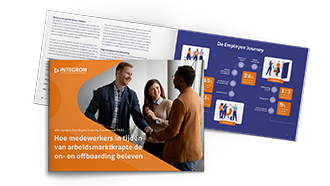In 2023, proper offboarding is even more important than before because of various developments and trends in the job market and corporate culture. The “war on talent” is a reality in many industries, with attracting and retaining qualified and experienced workers a major challenge. Poor offboarding can lead to negative word-of-mouth and can make it less attractive for potential candidates to apply to an organization. How to do it then? You can read about that here.
Another increasingly important concept is employer branding. Employers are judged more than ever on their corporate culture, inclusiveness and how they treat their employees. Negative offboarding can damage an organization’s image and undermine its position as an attractive employer.
Employee departure is no longer end of relationship
The phenomenon of “boomerang employees” is becoming more common, with positive offboarding experiences helping to retain valuable staff. With the rise of remote working and digitization, negative offboarding experiences can quickly be shared online, increasing the importance of careful offboarding management. The impact of the COVID-19 pandemic led to restructuring and increased emotional impact among departing employees, making supportive offboarding critical to long-term well-being and engagement. Organizations must recognize that an employee’s departure is not the end of the relationship, but an opportunity to leave a lasting positive impression and maintain valuable connections.
Offboarding in practice: only 10% are ambassadors of their previous employers
The Employee Journey Experience benchmark report published by Integron shows that only 10% are ambassadors of his/her previous employer. So here are plenty of opportunities to improve the experience! Apply the following tips to exceed expectations in the departing employee’s experience:
- Handle all practical matters in a timely manner and communicate with your employee about them; think about the number of vacation days, handling the lease car, any bonuses, the non-competition clause and clarify what the last weeks of employment look like.
- Jointly agree on how the departure will be announced to the rest of the team/organization and communicate this in a timely manner.
- Employees, in most cases, like to finish their work well; make sure there is a good internal transfer of knowledge and information.
- Employees, in most cases, want to end their working relationship in a pleasant way; provide an appropriate time to thank your employees. When this is not physically possible, provide a fun and original online moment.
- Collect feedback at the beginning of the departing employee’s last month; what can we learn from this employee to improve our internal organization and can we approach him/her to come work for us again in the future?
- Take the time for a personal and proper exit interview.
- Surprise the employee when he/she starts working for a new employer; follow the employee on LinkedIn and send a personal message when the employee starts at his/her new employer.
- Maintain contact during the post-employment period; who knows what you can be of service to each other in the future!
Want to learn more about offboarding and how you as an organization can make a difference in this? If so, please contact me without obligation.

Measuring customer satisfaction is invaluable in today's competitive marketplace. Customer satisfaction surveys (KTO) provide organizations with insight into their customers' expectations and experiences. This is essential for improving customer loyalty. Integron supports companies in conducting these surveys. Thus, we not only provide valuable data but also develop complete strategies to strengthen their customer relationships. In this blog, we explain why a KTO is a strategic tool for improving your services and creating satisfied and loyal customers.
The industry continues to do well. Also in the past year, the industry was overwhelmingly on the right side of the line and, along with wholesale, has the most loyal and enthusiastic customers in B2B Netherlands.
"There are issues at play right now that take priority over collecting feedback from employees and customers. 'Too big an investment'. SME organizations are not always willing to commission employee and customer surveys. Yet fortunately, there are quite a few organizations that do collect feedback from employees and customers, see the value of it and reap the benefits. And that is more than justified. It's absolutely valuable to gain insight into what's going on and what resonates with employees and customers.




